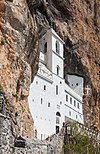Cathedral of Christ the Saviour, Banja Luka
| Cathedral of Christ the Saviour | |
|---|---|
| Саборни Храм Христа Спаситеља Saborni Hram Hrista Spasitelja | |
 Cathedral of Christ the Saviour | |
 | |
| 44°46′20″N 17°11′30″E / 44.772272°N 17.191787°E | |
| Location | Banja Luka, Republika Srpska |
| Country | Bosnia and Herzegovina |
| Denomination | Serbian Orthodox |
| History | |
| Dedication | Christ the Saviour |
| Architecture | |
| Completed | 1929 (built) 2004 (rebuilt) |
| Administration | |
| Archdiocese | Eparchy of Banja Luka |
The Cathedral of Christ the Saviour (Serbian: Саборни Храм Христа Спаситеља, romanized: Saborni Hram Hrista Spasitelja) is a Serbian Orthodox church located in Banja Luka, Republika Srpska, Bosnia and Herzegovina.[1]
A Holy Trinity Church was built during interwar Yugoslavia in the center of Banja Luka. The construction of the temple lasted from 1925 to 1929, and was solemnly consecrated on the Day of Salvation in 1939. During the German bombing on April 12, 1941, the temple was hit and the altar section (apse) was significantly damaged. In May of the same year, the Ustashas declared the temple a "mound of the city" and ordered the Serbs, Jews and Roma to completely demolish it, brick by brick.
During socialist Yugoslavia, while many buildings were rebuilt, the demolished Cathedral was not allowed to be reconstructed. During the Bosnian war, Eparchy of Banja Luka was granted permission for the destroyed temple to be rebuilt, and the monument to fallen soldiers was moved to a nearby site, also owned by the church. The erection of the new temple began in 1993 when the foundations were sanctified. This solemn act was performed by Serbian Patriarch Pavle with the bishops and clergy of the Serbian Orthodox Church. The temple was rebuilt under the name of the Cathedral of Christ the Savior, because, in the meantime, a temple was named after the Holy Trinity in Banja Luka (1963-1969), as a memorial to the demolished one, which the Orthodox Serbs thought would never be able construct again.
The cathedral is built of red and yellow travertine stone, originating from Mesopotamia, whose quality (excavation and processing) is guaranteed by prof. Dr. Bilbija, an expert from the Belgrade Institute for Material Testing. It is built with a three-layer wall: stone, reinforced concrete, brick. The domes are covered with golden stainless steel, brought from Siberia. Exterior construction work on the temple was completed on September 26, 2004, when the first liturgy was also served. The liturgy was served by 8 bishops with the clergy and deacons of the Diocese of Banja Luka, with the presence of tens of thousands of believers.
The present temple is architecturally identical[citation needed] to the previous one and is the tallest religious building in Banja Luka, with a bell tower 47 meters high and a 22.5 meter dome. The Bishop's Temple was consecrated by Bishop Ephrem on Salvation Day in 2009.[2]
On the occasion of the 20th anniversary of the founding and celebration of the Day of Republika Srpska, Patriarch Irinej served the Holy Blessed Liturgy in the temple on January 9, 2012.[3]
References[]
- ^ "Саборни Храм Христа Спаситеља - Бања Лука". hhsbl.org. Retrieved 2019-08-16.
- ^ "24sata.info - Banja Luka: Osveštan Hram Hrista Spasitelja". Archived from the original on 2016-03-04. Retrieved 2020-02-16.
- ^ "Banja Luka: Patrijarh Irinej služio liturgiju" (in Serbian). Radio-televizija Republike Srpske. 9 January 2012. Retrieved 10 January 2012.
| Wikimedia Commons has media related to Cathedral of Christ the Saviour (Banja Luka). |
- Churches completed in 1929
- 20th-century Eastern Orthodox church buildings
- Serbian Orthodox cathedrals in Bosnia and Herzegovina
- Serbian Orthodox church buildings in Bosnia and Herzegovina
- Churches in Banja Luka
- Buildings and structures in Republika Srpska
- Europe Eastern Orthodox church stubs
- Bosnia and Herzegovina building and structure stubs
- Republika Srpska stubs

